Kurds in Turkey: Crushed hopes after conflict in Diyarbakir
- Published
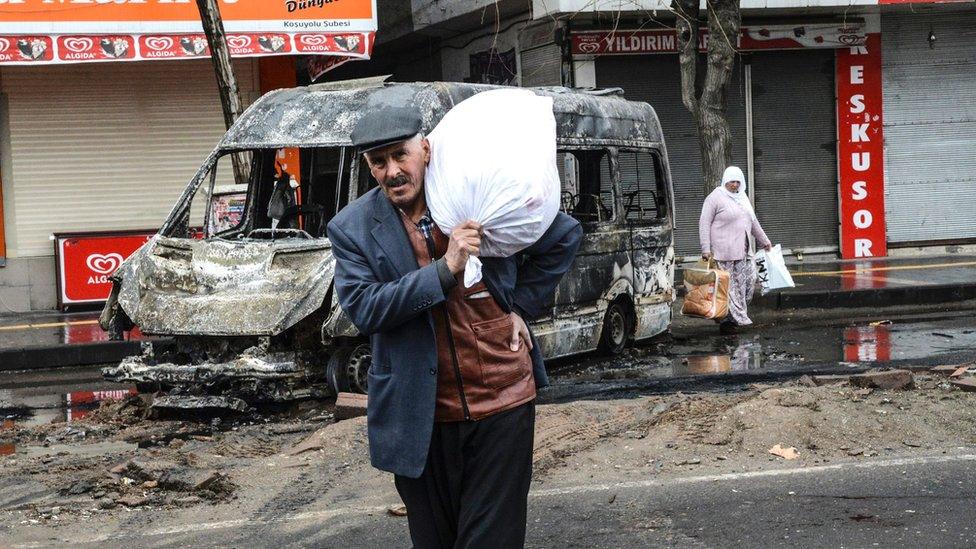
Many residents of central Diyarbakir were forced from their homes during the recent fighting
The mainly Kurdish city of Diyarbakir, in southeast Turkey, appears shell-shocked after three months of fighting between the security forces and the militant Kurdish Workers' Party (PKK).
The streets of Sur - the city's old town - are slowly filling with people again but there is still a sense of unease in the air. There was little mood to celebrate the Kurdish New Year last week, known as Newroz.
"People are waiting something to happen," says cafe-owner Mustafa, summing up the feelings of many in Diyarbakir.
"We feel like we are in purgatory, either there will be peace again or a full-on war."
It was during Newroz celebrations in Diyarbakir in 2013 that a statement was read out by imprisoned PKK leader Abdullah Ocalan called for a cease-fire with the Turkish state.
Ocalan's message of ideas and politics rather than guns and bombs was relayed by Kurdish officials to some two million people who had gathered in the city.
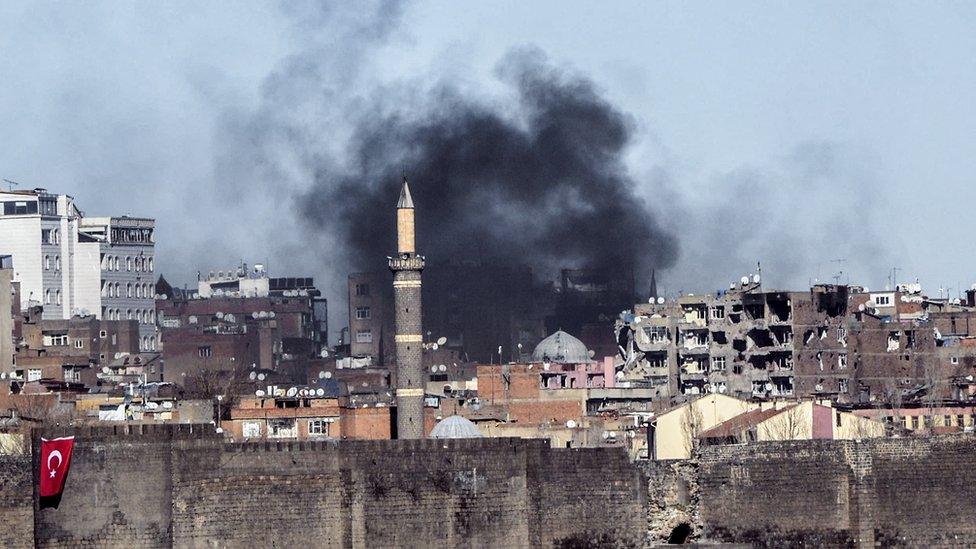
Heavy fighting - seen here in February - has subsided, but the walled city remains tense
There was dancing in the streets adorned in yellow, green and red - the Kurdish national colours. It raised hopes for an end to a decades-long conflict that has claimed some 40,000 lives.
But the peace process that followed was short-lived, and collapsed last July, plunging south-east Turkey back into violence.
Dampened hopes
Mustafa's cafe is in the Hasanpasa Hani, a 16th-Century inn and market normally bustling with shoppers, students and artists.
Despite the end of a three-month curfew, only a handful of people are sitting in Hasanpasa Hani's shady courtyard, sipping tea.
"This place used to be full of people," he says.
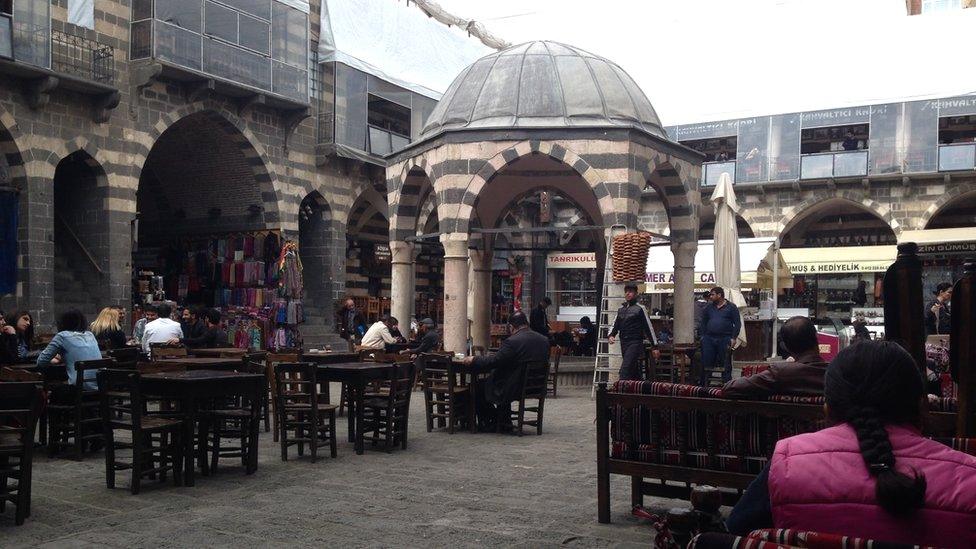
Hasanpasa Hani used to be a popular spot to take a break from shopping and meet with friends
The district of Sur has been at the centre of some of region's fiercest battles between the security forces and the PKK.
The Turkish military says it killed 279 militants in Sur. Activists say some of the dead were civilians.
Thousands fled their homes, and some neighbourhoods are still cordoned off by police barricades. Lorry-loads of rubble are being removed from residential areas.
The violence has also spread to big cities outside the southeast, including two car bombs in the capital Ankara that left dozens of people dead.
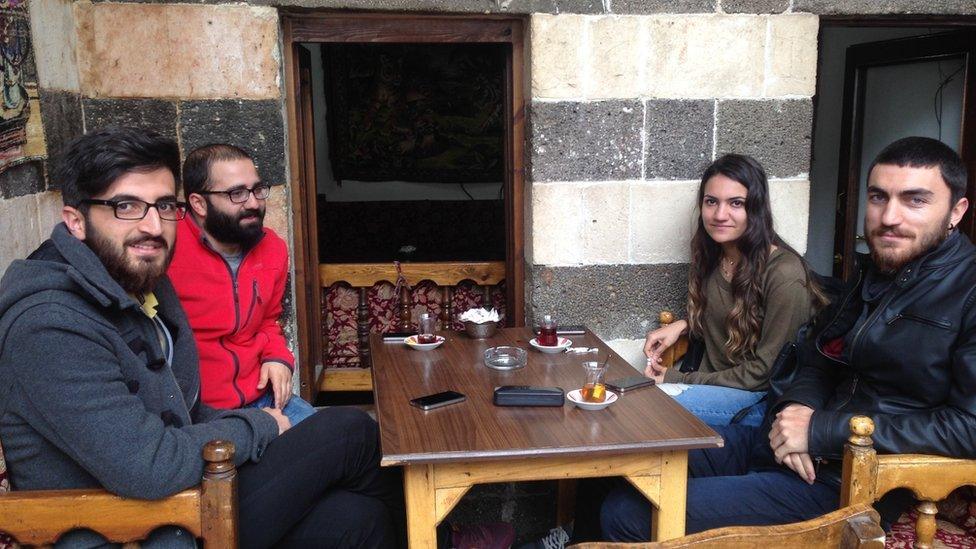
Young people relaxing in Hasanpasa Hani say the end of the ceasefire has left them despairing of politics
Critics have accused the Turkish government of responding with an authoritarian clampdown on all Kurdish dissent.
Recently, three academics were arrested after calling for an end to the security operations.
Young locals in Diyarbakir are also feeling the government's tight grip.
"We censor our lives a lot. We're scared to share anything on social media," says Bahri, 28, one of four young residents sitting around a table in Hasanpasa Hani.
"We have friends who were detained for posting tweets."
Sevket, a university student, says young people have been pushed towards the PKK by the government's "heavy-handed approach".
For Ozge, the end of the peace process has meant dashed hopes.
"Politics has failed us: both the government and the Kurdish political movement," she says.
Ailing economy
The fighting is over for now, but the police presence in Sur is very prominent, and visitors trying to enter are searched at checkpoints.
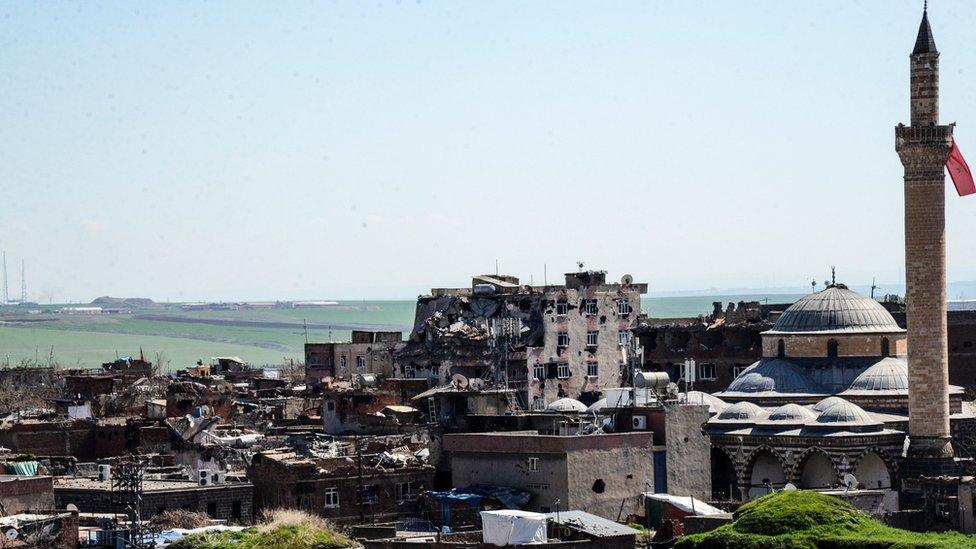
Many of Sur's buildings still bear the scars of fighting
The district is full of shops but there is little trading to be seen.
"Sur is part of me, it makes me sad to see it like this," says Dilek, a painter and teacher buying painting supplies.
"I don't think the city will heal for another decade."
The city's ancient fortress and imposing walls were listed as Unesco heritage sites in 2015, raising hopes of a thriving tourism business, but the recent fighting has put paid to that.
The local economy has been so badly affected that the Diyarbakir Chamber of Commerce says that more than 3,000 local companies have closed.
Its chairman, Ahmet Sayar, is worried the hardship will further fuel the conflict, and wants the government to boost the local economy.
"We have sent reports to the officials but we haven't received any reply," Mr Sayar says. "Local traders are asking if they are being punished for what's happening.
"But our first demand from the government is a lasting peace. Without that, no remedy is going to succeed."
BBC Monitoring reports and analyses news from TV, radio, web and print media around the world. You can follow BBC Monitoring on Twitter, external and Facebook, external.